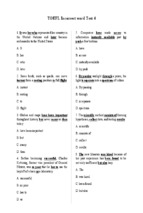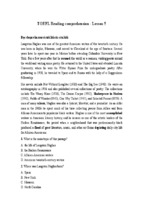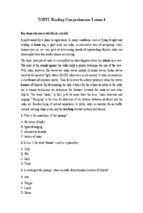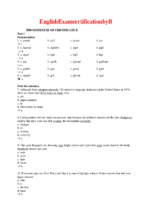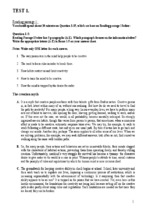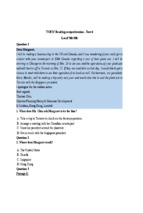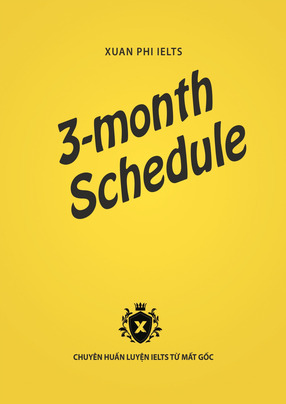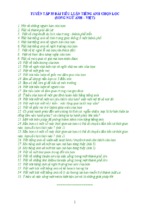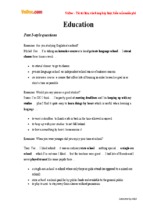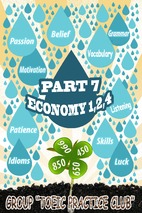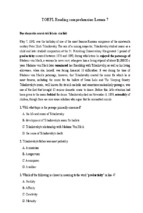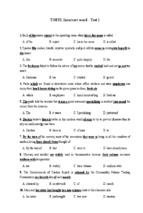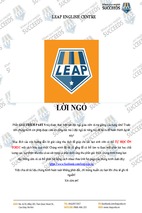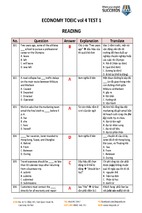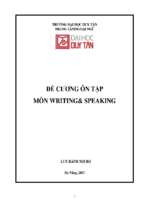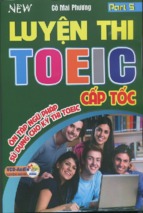The to infinitive and -ing
&
Grammar
When one verb follows another, the second verb is always either an -ing form or an infinitive, with or without to.
The form of the second verb depends on the first verb.
All the verbs in this unit marked " can also normally be followed by a that clause with the same meaning
(n see 137).
111 Verb + to infinitive
(can/can't) afford 'agree aim appear 'arrange attempt choose
"decide `demand deserve fail 'hope learn manage neglect
offer omit plan prepare 'pretend refuse seem tend
threaten (can't) watt wish
If you decide to add nuts ...
I hope to see you later.
Notice how the negative is formed:
If you decide not to ice it ...
The following verbs + to infinitive always have an object before the to infinitive:
"advise allow encourage forbid force invite order permit
'persuade 'remind 'teach 'tell *warn
Her father taught her to play tennis.
The teacher reminded the children to bring their swimming things.
The school allows students to wear jeans.
Advise, allow, encourage, forbid and permit can also be followed by -ing when there is no object:
I advise you to add nuts. or I advise adding nuts.
The following verbs + to infinitive sometimes have an object:
ask beg 'expect help 'intend 'promise want
We expected to be late. or We expected Tom to be late.
We wanted to stay longer or We wanted them to stay longer
A Would like, would love, would prefer, etc. are also followed by the to infinitive (a see B4).
Ea Verb + infinitive without to
Modal verbs (can, could, may, might, must, needn't, shall, should, will, would), had better and would rather are
followed by the infinitive without to (> see also Units 11, 13 and 14):
You should add the eggs slowly.
You needn't include nuts.
Help can be followed by the infinitive with or without to:
We helped them (to) start their car
Make and let (always with an object) are followed by the infinitive without to:
Let the cake cool for half an hour
I made my sister help with the cooking (= I forced or obliged her to help)
129
18
The to infinitive and -ing
El Verb + -ing
'admit avoid can't face can't help can't stand carry on *consider delay *deny detest
dislike enjoy fancy feel like finish give up *imagine involve keep (on) *mention
(not) mind miss postpone practise put off *recommend risk resist *suggest
enjoy making it.
Avoid adding the eggs all at the same time.
Keep beating the eggs.
I suggest adding a little lemon juice.
Notice how the negative is formed:
If you don't leave immediately, you risk not catching your plane
Can you imagine not having a car nowadays?
4
Verb + to infinitive or -ing (with no difference in meaning)
begin cant bear continue hate dislike like love prefer *propose start
Continue adding the flour or Continue to add the flour
I prefer using apricots. or I prefer to use apricots.
g love making cakes. or I love to make cakes.
Two -ing forms do not usually follow each other:
I was starting to make a cake when the phone rang. (not
A Like, prefer, hate and love can be followed by the to infinitive or -ing, but would like, would prefer, would hate
and would love are always followed by the to infinitive
She would like to go out but we would prefer to stay in.
A Like + to infinitive has a slightly different meaning from like + -ing:
I like to catch the early bus on Mondays. (= this is a good thing to do or is a habit, but not necessarily
something I enjoy)
I like swimming (= I enjoy it)
El Verb + to infinitive or -ing (with a difference in meaning)
The following verbs have two different meanings depending on the verb form that follows:
*remember *forget *regret try stop mean go on
Verb + to infinitive
Verb + -ing
Remember to check whether the cake is ready.
(= remember an action you need to do)
I remember checking that I had my keys when!
left the house. (= have a memory of a past action)
Don't forget to add the baking powder
(= fail to remember something you need to
do)
I'll never forget going to school on my own for the
first time. (= lose the memory of something you
did)
I regret to inform you that your application
was unsuccessfuL (L I am sorry to tell you ...)
-
We regret sending our daughter to that schooL
(= we wish we hadn't)
She stopped to have a rest.
(= in order to have a rest)
Stop beating when the mixture is pale and fluffy.
(= finish doing it)
130
The to infinitive and -ing
They don't mean to upset you.
(= they don't intend to)
If you go by train, that means taking a taxi to the
station. (= it involves)
He went on to tell us how to make a different
cake. (= the next thing he did was to tell us ...)
They went on cycling until they reached the farm.
(= they continued)
Try to ice the cake quickly. (= attempt to do it
quickly if you can)
18
Try adding nuts as it will improve the flavour
(= do it as an experiment)
L.,
Verb + -ing or infinitive without to (with a difference in meaning)
The following verbs connected with the senses may be followed by an object and either -ing or the infinitive
without to:
feel
hear
noi ice see
varc h
Notice the difference in meaning between verb + -ing and verb + infinitive without to:
I watched the boys playing football. (= an activity continuing over a period of time)
I watched the boy kick the football into the road. (= a short completed action)
She heard her mother singing as she came downstairs. (= a continuing action)
She heard the doorbell ring. (= a short completed action)
Fal Verb + that clause
All the verbs marked • in this unit can also be followed by a that clause with the same meaning
She admitted taking the money. = She admitted (that) she had taken the money.
Imagine sitting on a tropical beach with a cool drink. = Imagine (that) you're sitting on a tropical beach ...
I suggest adding some lemon juice. = I suggest (that) you add some lemon juice.
I recommend using sultanas and apricots. = I recommend (that) you use sultanas and apricots.
They agreed to leave early. = They agreed (that) they would leave early.
L. Adjective + to infinitive
Many adjectives can be followed by the to infinitive. These are some common ones:
afraid cheap 'dangerous delighted 'difficult 'easy
expensive happy *hard impossible interesting 'mar
pleased possible safe sorry surprised
I'm surprised to see you here.
The book was hard to understand and at times I found it almost impossible to read.
The adjectives marked • can sometimes also be followed by -ing with the same meaning
It's nice meeting friends after school. or It's nice to meet friends after school.
n See also Unit 21, B1 for adjectives followed by a preposition + -ing or a noun.
131
1
8 The to infinitive and -ing
Grammar exercises
fl Complete this conversation using the verbs in brackets.
to
Lean
Andy:
I've decided (1)
Sally:
Andy:
(leave) my job next month
But I thought you enjoyed (2)
Oh, I do. But I feel like (3)
Sally:
Didn't you promise (4)
Andy:
(work) in an architect's office.
(do) something different for a while.
Yes, I did but I just can't stand (S)
(6)
(stay) there at least two years?
(work) with those people. One of them refuses
(stop) talking while she works, another one keeps (7)
to himself. And then there's a man who;
which he always gets wrong. I detest (9)
Sally:
(sing)
(tell) awful jokes all the time,
(work) with all that noise around me.
It sounds quite a cheerful place to me. Can't you manage (10)
(ignore) them and
get on with your work?
Andy:
No, I can't. I just can't carry on (11)
(12)
Sally:
(go) there every day. I'm hoping
(go) abroad for a bit.
Well good luck.
n
Choose the correct form of the verb.
1
I noticed the man drop / dropping Ito drop his ticket so I picked it up for him.
2
The tour guide advised the tourists not take / taking Ito take too much money out of the hotel with them
3
I heard the horses come / coming / to come down the lane so I waited for them to pass before driving on.
4 The old man said he would love have / having / to have the chance to fly in an aeroplane again.
5
Don't make the children come / coming / to come with us to the shops if they don't want to.
6
I saw the boy jump / jumping / to jump into the lake before anyone could stop him.
7
I recommend phone / phoning/ to phone the restaurant before you set off.
8
We were so pleased hear I hearing I to hear that Josh can come to the wedding after all.
9
The school only allows students eat / eating / to eat in the dining room.
10
It was my drama teacher who encouraged me become! becoming! to become an actor.
132
The to infinitive and -ing
18
El Fill in the gaps with the correct form of the verbs in the box.
book buy chat finish get go inform leave lend make send throw watch wear write
buying
a new dress.
1
If I go to my friend's wedding it will mean
2
Please try
into the arrivals hall.
3
Will you stop
4
I forgot
for ages.
5
The children went on
times to stop.
6
We regret
7
Tommy says he doesn't know where my jacket is, but I clearly remember
8
When you go out of the hotel, remember
we've only got one between us.
9
Why don't you try
10
to the airport in good time - I'll be nervous if I don't see you when I come
this book before I go to bed.
that noise? I'm trying
a table at the restaurant and it was full when we got there, so we had to wait
their ball against the wall, although they had been told several
you that the course you applied for is now full.
the room key with reception because
sunglasses? Then you might not get so many headaches.
I saw Philip when I was in the park so I stopped
I meant
12
I regret not
13
After getting a degree in biology, my son went on
I'll never forget
to him.
you a text when I got to the hotel but I didn't have time.
11
14
it to him.
to Egypt with my sister because she says it was a really great trip.
a book about monkeys.
the sun come up over the mountains when I was in the Himalayas.
sentences by
fl io Some of these it is incorrect,Cambridge First candidates have mistakes. If a sentence is correct,
mark it with a cross (X) and correct it.
mark it with a tick (/). If
1
Not all of the students can afford geitig abroad on the trip.
2
x to go
I hope to visit the museum the next time I visit you.
3
He pretended knowing nothing about it, but I knew he did.
4
The guard refused to sell me a half-price ticket for the journey.
5
I didn't feel well, but I managed getting downstairs.
6
Famous people deserve to have a private life without journalists following
them everywhere.
7
He wrote the letter because he wanted to avoid to be found out.
8
I don't know why the teachers delayed to tell us the results.
9
I don't feel like going camping because I like holidays where I can relax,
10
I think that a lot of women dislike going shopping.
11
I've put off writing you this letter for months, but finally here it is.
12
They suggested to take the trip to Williamstown on the first day.
133
IIEr
Reading and Use of English Part 1
For questions 1-8, read the text below and decide which answer (A, B, C or D) best fits each gap.
There is an example at the beginning (0).
Balloon adventure
A
Brian Jones and Bertrand Piccard were the first team to go (0)
the world in a balloon.
Nobody (1)
them to finish their astonishing 19-day expedition, especially as they had to
with poisonous fumes and temperatures of -50°C.
(3)
Brian had run a business, but he got tired of it and (3)
to buy a balloon. Before long he
was one of the country's (4)
balloon instructors and pilots. Why did he risk everything for
one trip? He says he was not a very confident child: 'When I was seven a friend (5)
me go
down a water slide with him. I still (6)
being absolutely terrified. I've never learnt to swim
properly. He thinks everyone should face their greatest (7)
and that is one reason why he
went up in the balloon. Six of the 19 days were spent over the Pacific Ocean. Brian says he won't
to do it again because there are so many other things he wants to do.
(8)
0
® round
B through
C across
D above
1
A expected
B hoped
C intended
D admitted
2
A do away
B get along
C keep up
D put up
3
A thought
B considered
C afforded
D decided
4
A unique
B preferable
C leading
D suitable
5
A demanded
B made
C encouraged
D persuaded
6
A forget
B remind
C remember
D regret
7
A fears
B suspicions
C disturbances
D frights
8
A delay
B imagine
C attempt
D suggest
Grammar focus task
These are some verbs from the exam task. Without looking back, put them into the table below.
Three of the verbs can go in two columns.
afford admit attempt consider decide delay demand eneettrage
expect hope imagine learn persuade remind suggest want
Verb + to infinitive
Verb + object + to infinitive
afford-
134
Verb + -big
admit, encourage
EVICC,ACUE.
7
Fi
Conditionals (2)
unless, in case; provided/providing that and as/so long as;
I wish and if only, its time; would rather; otherwise and or else
Context listening
Ell You are going to hear a man talking to a group of people about something they are going to do
tomorrow. Here are some of the things they are taking with them. What do you think they are going to do?
fI Dli; Listen and check if you were right.
El DE Listen again and fill in the gaps. Stop the recording when you need to.
1 We're going
unless
the weather gets much worse.
that it doesn't snow too heavily tonight, I'll see you back here at six o'clock.
2
3
4
You need a whistle
we set out early.
We won't reach the top of the mountain
you get separated from the rest of the group,
5
you didn't bring large cameras.
6
we all stay together, we'll have a great time.
7
8
I
you'd come a few weeks ago.
we had dinner now!
Look at sentences 1, 2, 3, 4 and 6 in Exercise 3. What do you notice about the tense of the verbs
which follow the words in the gaps?
135
19
Conditionals (2)
Grammar
O unless
Unless means 'if not and is used with the present tense to talk about a condition in the present or future
Were going unless the weather gets much worse. (= if the weather doesn't get much worse)
We won't have time to reach the top of the mountain unless we set out early. (= if we don't set out early)
Unless you drive more slowly, I'll be sick. (= if you don't drive more slowly)
This water isn't safe to drink unless you boil it. (= if you don't boil it)
El in case
In case shows that an action is taken to prepare for a possible event or situation.
We use the present tense after in case when we explain that a present action prepares us for a future event:
Take a whistle in case you get separated. (= there's a chance you might get separated and a whistle will help us
find you)
Make sure you have my phone number in case you miss the bus. (= I expect you'll get the bus, but if you miss it,
you'll need to phone me)
We use the past simple after in case to explain a past action. It often shows that you did something because
another thing might happen later:
He took his surfboard in case they went to the beach (= he took his surfboard because he thought they might go
to the beach)
shad taken plenty of cash with me in case the shop didn't accept credit cards.
A In case does not mean the same as Compare:
I'll cook a meal in can Sarah comes over tonight. (= I'll cook a meal now because Sarah might visit us later)
I'll cook a meal if Sarah comes over tonight. (= I won't cook a meal now because Sarah might not visit us)
fl provided/providing that and as/so long as
These expressions are used with a present tense to talk about the future. They have a similar meaning to if
As long as we all stay together, we'll have a great time.
You'll do very well in your interview so long as you don't talk too fast.
Provided (that) it doesn't snow too heavily, see you here at six o'clock.
My father says he'll meet us at the airport, providing (that) we let him know our arrival time.
A If unless, in case, provided/providing that and as/so long as are all followed by the present tense to talk about
the future. Some conjunctions (when, until, after, before, as soon as) are also followed by the present tense to talk
about the future (> see Unit 6,83).
4
wish and only
I wish and if only are both used to express a wish for something. They have the same meaning, but g. only is less
common and is usually stronger.
Wish / if only + the past simple is used when we express a wish about a present situation:
I wish you loved me. (= but you don't love me)
I wish I knew the answer. (= but I don't know the answer)
If only he could drive. (= but he can't drive)
If only we had a bigger flat! (= but our flat is small)
A Notice that we use the past tense, even though we are talking about now.
136
Conditionals (2)
19
We can use were instead of was after land he/she/it
I wish I was/were clever like you. (= but I'm not clever)
I with the weather wasn't/weren't so wet here. (= but it is wet)
If only my sister was/were here! (= but she isn't here)
Wish / ffonly + the past perfect is used when we express a wish or regret about the past. It's like the third
conditional - the event can't be changed:
She wishes she'd (had) never met him. (= but she did meet him)
I wish we'd (had) come a few weeks ago. (= but we didn't come)
If only I hadn't broken that priceless vase! (= but I did break it)
Wish / if only + would is used when we express a wish:
for something to happen now or in the future:
wish you would stay longer
If only the rain would stop!
for someone to do something (often when we are annoyed):
I wish you wouldn't leave your bag in the doorway.
I wish the waiter would hurry up. I'm so hungry!
Notice the difference between I hope + will and I wish + would when talking about the future
Ihope he will phone. (= there's a good chance he will phone)
wish he would phone. (= it's unlikely he will phone)
Ei it's time and would rather (not)
These expressions are followed by the past simple with a present meaning
It's time we ate dinner now.
It's time I went home.
I'd rather you didn't bring large cameras.
We'd rather the flat was bigger, but it's all we can afford.
A When the subject of would rather is the same as the subject of the following verb, we normally use the
infinitive without to:
They'd rather eat at home as they have a small baby.
I'd rather go home by taxi at this time of night.
We'd rather not spend too much money as we're saving for a new car
6
otherwise and or else
These words mean 'because if not':
I have to go to bed early, otherwise I get too tired. (= if I don't go to bed early, I get too tired)
Back up your work as you go along otherwise you could lose it all. (= if you don't back up your work, you could
lose it all)
Carry that tray with both hands or else you'll drop it. (= if you don't carry it with both hands, you'll drop it)
They have to have a car or else they wouldn't be able to get to work. (= if they didn't have a car, they wouldn't be
able to get to work)
137
19
Conditionals (2)
Grammar exercises
n Rewrite these sentences using unless instead of if not.
1 Sam will pass his driving test if he doesn't drive too fast.
Sam
pass his &Sing test ptess he drives too fast.
2 They'll be here soon if their plane isn't delayed.
3 If you're not in a hurry, you could take the bus.
4 I won't be able to come to see you tomorrow if my brother can't give me a lift.
5 If the factory doesn't increase its production, it will dose down.
6 If you don't write your address down for me, I'll forget it.
7 I won't stay in that hotel if it hasn't got a good restaurant.
8 If I don't hear from you, I'll meet you at six.
O Fill in the gaps with in case or U.
1 Elaine will post the letters
2 I'll go for a swim
3 I'll teach you to windsurf
she goes out
I finish college eady.
you teach me to play golf.
4 I always check my phone when I come out of school
5
I'll take Tim's address with me
I have time to visit him while I'm in London.
6 Our team will win the match
our goalkeeper plays like he did last week.
7 It's a good idea to back up your contacts list
8 I'll leave these films here
I've missed a call.
you lose your phone.
you have time to watch them.
O 4F.) Choose the correct words in these sentences by Cambridge First candidates.
1 The journey doesn't take too long unless / if it rains, and then it takes ages.
2 I think it's safe for children to go to school by bike unless / provided that they don't live too far away.
3 The police gave the orders to close all the doors as long as / in case the robbers were still hiding in the
building.
4 Zoos should be allowed unless / as long as the animals are well looked after.
5
Bring your passport provided that/in case we go to Copenhagen on the boat.
6
People don't work more than ten hours a day unless / provided that it is really necessary.
138
Conditionals (2)
19
4 Chloe is on holiday in a foreign city. She's been so busy admiring the sights that she has got lost.
What is she thinking? Complete her sentences.
1 I haven't got a map. I wish I hod2 The streets all look the same. If only the streets alan't all Lock the. Same'
3 I didn't bring my phone. I wish
4 I can't speak the language. If only
5 I didn't buy a phrase book. If only
6 I'm hot and thirsty. I wish
7 I came here alone. I wish
8 I need someone to help me. If only
9 I'm sorry I came here. I wish
10 I want to be back in my hotel. If only
Es Complete the email with the correct form of these verbs. You will need to make some of the
verbs negative.
be be behave bring can change finish have learn know miss use
Joe
To:
Subject: Party!
Hi Joe
a bigger
MeI'm having a birthday party on Saturday in my uncle's flat. I wish I (1)
my own place but anyway,
flat myself but I haven't. Of course I'd rather (2)
no more than thirty people
my uncle has offered me his flat so long as there (3)
by midnight. So please come and bring a friend,
and provided that the party (4)
Matthew with you because he always causes trouble.
but I'd rather you (5)
I wish he (6)
unless everyone (7)
to behave better. I had to work hard to persuade my uncle and
well, he won't let me use his place again.
the road where my uncle lives. If you
I'm attaching a map in case you On
find it, just ring me. So I'll see you on Saturday unless my uncle
his mind!
By the way, has Katherine changed her phone number? I can't get hold of her. I wish
rude to her last week,
1 (11)
as she's not speaking to me now.
Must go or else I (12)
the bus to college I See you Saturday.
Robin
139
II
Reading and Use of English Part 4
For questions 1-6, complete the second sentence so that it has a similar meaning to the first sentence,
using the word given. Do not change the word given. You must use between two and five words,
including the word given. Here is an example (0).
0
Simon now regrets doing a part-time course.
WISHES
Simon now
1
wishes he haat. done
a part-time course.
The engine won't start if you don't press both buttons.
UNLESS
The engine won't start
2
both buttons.
We anived in good time as we were afraid the coach might leave without us.
CASE
We arrived in good time
3
without us
You can use my laptop but I must have it back by ten o'clock.
PROVIDED
You can use my laptop
4
it back to me by ten o'clock.
If we don't start cooking now, the food won't be ready in time.
ELSE
It's time we
5
the food won't be ready in time.
Stop playing your drums at night, otherwise the neighbours will complain.
KEEP
The neighbours will complain
6
your drums at night.
The students don't really like eating in the school canteen.
RATHER
The students
in the school canteen.
Grammar focus task
Compare these sentences with the sentence pairs above. Is the meaning the same (S) or different (0)?
1 You must press both buttons or else the engine won't start.
5
2
We arrived at the correct time because we were worried the coach might leave without us.
3
It's essential that I have my laptop at ten o'clock, but you can use it till then.
4
Keep playing your drums at night unless the neighbours complain.
6
140
It's a pity the food won't be ready in time.
5
The students aren't very keen on eating in the school canteen.
Prepositions (1)
Prepositions of place and time
Context listening
You are going to hear a news broadcast. Before you listen, look at the pictures and guess what the
news stories are about.
Listen and check if you were right. As you listen, put the pictures in the order in which you
hear the stories.
2
1
cE
Listen again and answer these questions. Stop the recording when you need to.
Where will the Prime Minister be for the next two days?
2
When will he fly to Mexico?
3
Where did Moira MacNab's plane hit bad weather?
4
When does she say she will be quite well?
5
How far do the traffic jams stretch?
6
How long will part of the motorway remain closed?
7
Where was the security man?
8
When was the manager released?
fl Look at your answers to Exercise 3.
1 Which prepositions are used in the answers about time?
2
Which prepositions are used in the answers about place?
at a, conference in WAshillfon
20
Prepositions (1)
Grammar
But compare:
Their eyes me
O Prepositions of place
in, at and on
In is used:
for someone or something inside a limited area
(e.g. a town, a country, a garden):
Fred jumped over the gate
The Prime Minister is in Washington.
She is due to appear in Edinburgh
There are some lovely trees in this park.
for someone or something inside a building,
room or container:
They heard shouting in the manager's office.
Do you keep your credit cards in this wallet?
The plane was flying across the Mediterranean.
On is used:
for a point on a fixed line (e.g. a road, the coast):
above and over
She's holidaying on the north coast of Africa.
We stopped at a café on the road to Brighton.
for a point on a surface:
Above or over is used if one thing is higher than
another:
want to hang this picture on the wall.
with floor and ceiling
Over is used when one thing covers another
There's a spider on the ceiling.
for public transport vehicles, such as buses, trains
or planes:
Above is used when the two things are not directly
on top of each other
They met on a plane.
I can't read on the bus.
but we use in for cars and taxis:
Above is used in documents:
He came home in a taxi.
At is used:
when we think about a place in terms of its
function or as a meeting place
He will have talks at the White House.
I keep my tennis racket at the sports club.
I'll see you at the theatre.
for an event:
He will remain at the conference.
There were a lot of strangers at the party.
across and over
They built an extra room above/over the garage.
Put this rug over that old chair.
The hotel is above the beach
Please don't write above the line.
under and below
Under or below is used if one thing is lower than
another:
The garage is below/under the workshop.
Under is the opposite of over
There's a beautiful old chair under that rug.
Below is the opposite of above
The beach is below the hotel.
Below is used in documents:
Please don't write below the line.
There are some places where either across or
over can be used:
along and through
a footbridge across/over the motorway
a route across/over the mountains
a view across/over the valley
There were cheering crowds along the route of
the procession.
We strolled along the river bank at dusk
142
Along is used for something which follows a line:
Prepositions (1
)
20
Through means passing from one side of something
On is used for dates and days (including special days):
to the other side of it:
on Monday, on 3rd December (note that we say 'on the
third of December'), on New Year's Day, on Christmas
The road goes through Birmingham.
I struggled through the crowd to reach the cafe.
We could see the sea through the trees.
The train went through the tunnei
by and beside
By can be used in the same way as beside, meaning
'next to:
Day, on my wedding anniversary
In is used for all or part of a period of time:
in the afternoon, in winter, in the twenty-first century,
in the Middle Ages
by and until
A security man was standing by/beside the door.
By means that something happens not later than,
and probably before, the time mentioned:
Ed love to live by/ beside a lake.
She intends to be in Chile by the end of the year. (= on
between and among
Between is used when we talk about two places,
things or people
the motorway between London and Oxford
The dictionary is between the grammar book and
the atlas.
Among is used to identify something as part of
a group:
Is there a dictionary somewhere among these books?
31st December at the latest, but probably before that)
Can we finish this work by four o'clock? (= not later
than four o'clock)
Until means that something continues up to, but not
later than, the time mentioned:
Part of the motorway will remain closed until this
afternoon. (= it will open this afternoon)
Until is often used with a negative, meaning 'not
before':
We can't eat until all the guests arrive. (= we can eat
beyond and behind
when they are all here)
Beyond is used for something that is further away
from us than something else (we may or may not be
able to see it):
A Till is often used instead of until in informal speech:
Traffic jams were stretching beyond the motorway.
You can't see the lake, it's beyond the forest.
Behind is used for something that is partly or
completely hidden by an object in front of it:
The robber stood behind the door, hoping he
wouldn't be seen.
nPrepositions of time
at, on and in
At is used:
for a point of time
at the start of her tour of Europe
for the time of day:
at six o'clock, at dawn, at lunchtime
for seasonal holidays:
We can't eat till all the guests arrive.
in, during and for
In and during are often used with the same meaning
In/During the summer we often go for long walks.
but during shows a particular event against the
background of a period of time
The manager was released during the night.
especially if it is an interruption:
They walked out of the hall during the politician's
speech. (= while the politician was giving a speech)
For shows how long something lasts:
He will remain at the conference for two days.
We went to Spain for the summer.
In shows how soon something happens:
In less than an hour we had heard all about
his adventures.
I'll meet you in ten minutes.
at Christmas, at Easter
in the following expressions:
at the weekend, at first, at last, at present (= now),
at the moment (= now), at times (= sometimes),
at once (= immediately)
43
20
Prepositions (1)
Grammar exercises
nChoose the correct word in each sentence.
1 She hid below / under the bed until the visitors had gone.
2
We arrived at our destination at / in dawn.
3
During the night, we heard strange noises in the room over / above us.
4 The gymnast sailed through / along the air and landed lightly on the mat.
5
The detective found an earring on the path along / between the pool and the house.
6
I need to get some cash so I'll see you at the cinema in / by ten minutes.
on the train
n Sara is in the box. and she's phoning her friend Rebecca. Complete the conversations with the
prepositions
at at by by during for n in on over till
In Rebecca's office, 11.30 am.
Rebecca:
Rebecca White.
on
Sara:
Hi, it's Sara. I'm (1)
the train.
Can you meet me (2)
the station?
Rebecca:
What time?
Sara:
Three.
Rebecca:
I think so. The cars got a puncture. If I can arrange to
get it fixed (3)
my break, VII be there.
Sara:
Thanks, that's great.
At the garage, 1.40 pm.
Rebecca:
Can you fix this puncture for me?
Mechanic:
Yes, probably. But my assistant won't be back from
lunch (4)
half an hour and I'll be
working on this other job (5)
then
Rebecca:
Well, I've got to collect someone from the
station (6
three.
Mechanic
Oh, that's no problem. Well have it done
half past two easily.
(7)
Rebecca:
Thanks. ni be back (8)
an hour, OK?
Mechanic:
Fine. See you then.
On the train, 2.10pm.
Sara:
Hello?
Rebecca:
The car's being fixed now. I'll wait for you (9)
the main door of the station,
so I can help carry your stuff.
Sara:
No, don't worry. I haven't got anything heavy. I'll see you (10)
the car park.
It's just (11)
the footbridge, isn't it?
Rebecca:
Yes, all right. See you there.
Sara:
Bye.
144
Prepositions (1)
20
Fill in the gaps in this email with suitable prepositions.
e
Hi everyone!
At
the moment we're still
How are you? Were having a great time in Thailand. (1)
the north of the country. This evening we're flying to Bangkok where well visit the
(2)
the morning and then well probably go shopping (4)
amazing palaces (3)
a few hours.
the weekend were heading south to Phuket. We're going to book a morning
(5)
!midday at the latest. We'll go to Phi Phi island from there
flight so we'll be there (6)
the
Monday. We've booked a bungalow. The tourist office says it's (8)
(7)
the beach
the middle of gardens which lie (10)
end of a long beach (9)
and the hillside. We're going to go snorkelling and we can't wait to go swimming (11)
about a week and then it will be time to come
the tropical fish! We're staying there (12)
home. See you all then!
Love,
Emmy and Sam
4 A hotel owner is showing visitors round his new premises.
Fill in the gaps with prepositions.
the lounge, a beautiful room, with
is
We're now standing (1)
the ceiling and a view (3)
paintings (2)
it. The cellar is being decorated
the park to the hills (4)
present and we're going to open it as a restaurant
(5)
then we are
a few months' time. (7)
(6)
serving meals (8)
the dining room only.
the sides of the road
Do you see the trees planted (9)
up to the front door? They're going to be hung with coloured lights
that
special occasions. If we go (11)
(10)
wooden door, we'll reach the rose garden, where you can see some
the bushes.
interesting sculptures on display (12)
ci
Correct the mistake in each of the following sentences by Cambridge First candidates.
lam going to see an English film in the cinema this evening.
2
Hook forward to seeing you in the weekend.
3
at
Both of the courses are in the same day, so I will have to miss one.
4 A TV company was on our school yesterday.
S
I'll come to your house in the holidays during a few days.
6
I want to know why the departure of the train was delayed by 8:15 pm.
7
I advise you to have a rest during a week and then start again.
8
I need to finish this letter because I must post it until 3 o'clock.
9
I enjoyed meeting your family for my short stay at your house.
20
I was travelling from Latvia at 10th December.
145
II
Exam practice
Reading and Use of English Part 2
For questions 1-8, read the text below and think of the word which best fits each gap. Use only one
word in each gap. There is an example at the beginning (0).
New residents on the farm
There is a new arts centre on the road between Salisbury and Winchester on what (0)
used.
to be a farm. The old farm buildings have been made (1)
artists' studios and
workshops for people producing a variety of work such (2)
jewellery.
pottery, furniture and
One barn has been made into an attractive gallery, displaying work produced at the arts centre, in
to holding exhibitions by more famous artists (4)
(3)
present there
is a lovely exhibition of modern glass from Scotland.
When the artists are in their studios, visitors can talk to them about (5)
they are
doing. For artists, who can feel lonely at times, (6)
is good to be in a place where they
are among people who understand their work. They can go across the yard for coffee and share their
problems with (7)
other.
The centre is open to visitors (8)
weekdays and at weekends from 12.00 to 4.00.
Grammar focus task
After you have checked your answers to the exam task, read the text once more. Then, without looking
back at the text, complete these sentences with the correct prepositions.
on
1 The arts centre is
the road
Salisbury and Winchester.
2
When the artists are
4
Artists can feel lonely
5
It's good to be in a place where they are
6
146
There is an attractive gallery displaying work produced
3
They can go
the arts centre.
their studios, visitors can talk to them
times.
the yard for coffee.
people who understand their work.
Prepositions (2)
Prepositions which follow verbs and adjectives; prepositions
to express who, how and why; expressions with prepositions
Context listening
n
You are going to hear a man called Andy telling his wife Dawn about a fire. Before you listen, look at the
pictures. What is happening in each one?
A
ci*
Listen and decide which picture best fits what Andy tells Dawn. What is wrong with
the other two pictures?
n cg
Listen again and fill in the gaps.
to
7
I covered my face
2
There's no need to shout
8
You could have been
3
I had a bit of an adventure
home.
9
Then the fire brigade were
4
I called the fire brigade
5
I got in
6
I smashed a window
hammer.
What's happened
my phone.
breaking a window.
hitting it with a
a handkerchief.
real danger.
control.
saving their
10 I hope they thanked you
property.
11 Do you forgive me
12 I can't be angry —
being late?
you now.
4 Look at your answers to questions sand 6 in Exercise 3. Which preposition is used to show how
something is done?
147
21
Prepositions (2)
Grammar
Er Prepositions which follow verbs and adjectives
Verb + preposition
Some verbs are nearly always followed by a particular preposition. These include
approve of: Yasmina doesn't approve of children having too many toys.
enquire about I am writing to enquire about your advertisement.
insist on: She insisted on paying for the taxi
look forward to: IM really looking forward to eating it.
succeed in: Did Pierre succeed in finding accommodation?
Notice that prepositions are followed by a noun or by the -ing form of a verb:
We enquired about our reservation at the hotel. We enquired about booking a room.
Verb + object + preposition
Some verbs are nearly always followed by an object and a particular preposition. These include
accuse someone of: The rock group accused their manager of stealing their money.
congratulate someone on: Heidi congratulated me on my exam results.
forgive someone for: She can't forgive Maurice for all the lies he told.
prevent someone/something from: The bus strike hasn't prevented people from coming to work.
suspect someone of: I suspect Maryann of being dishonest.
Verb + different prepositions
Some verbs can be followed by different prepositions with a change in the meaning. These include:
agree with someone and agree about something
I quite agree with you, I think you're right. (= with a person)
My father and! don't agree about politics. (= about a subject)
ask for something and ask about something
He asked me for some money (= he requested)
She asked me about my plans for the summer. (= she enquired)
laugh about and laugh at
I was late but he wasn't angry, he just laughed about it. (= found it funny)
I can't wear this hat. Everyone will laugh at me. (= make fun of)
think of and think about:
'What do you think of my new jacketr 'It's great: (= what is your opinion?)
'What are you thinking about?' Lunch - I'm hungry!' (= what is on your mind?)
throw at and throw to (also shout at / shout w and point at / point to):
The little boy threw the ball to his father. (= expecting him to catch it)
Don't throw toys at your sister - you might hurt her. (= intending to hit her)
to be + adjective + preposition
Some adjectives are usually followed by particular prepositions, for example
angry about (something): She's angry about the theft of her purse.
angry with (someone): He's very angry with his assistant
good/bad at (something): She's good at drawing flowers.
pleased about (something): My parents weren't pleased about my bad report.
pleased with (something or someone): Granny was very pleased with the book you sent her.
rude / polite / (un)kind to (someone): Don't be rude to anyone at the party.
148
- Xem thêm -

